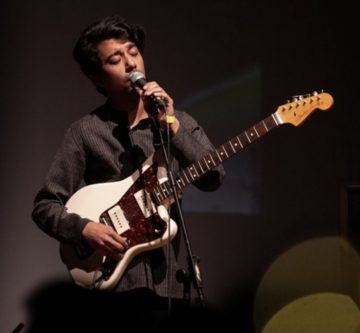Tanaïs at the SAADA website:
TANAÏS: Your work inhabits multitudinous Black – Muslim – Desi Diasporic connections, and as a producer, looping and sampling feel like an homage to Hiphop / Atlanta / Outkast. And yet, there is a resounding indie / synth rock / dream pop quality to the music, which slowly crescendos into what I hear as qawwali influences in your music. It feels like a syncretic, stateless, borderless sound.
 HUMEYSHA: There’s a line from Grandmaster Flash about how hip-hop pioneers would “adopt” from the history of music by taking a few seconds of a groove, playing it on repeat, and finding a rhythm for audiences to dance to. Whether it’s with a few bars from a qawwali recording or my guitar experiments, I think I’ve always been in love with the sampling technique for how it embodies a very contemporary way we make our selves. To intimately know histories of music, dig through the archives, and identify passages that loop seamlessly, without clicks or pops where the endings match the beginning—it’s a tool of infinite possibility despite being constrained by a strict sense of time and bound up with material. People like you and I assert how we are similarly not fixed, static identities bound only by our inheritance or biology; what matters is what we do with it, by remixing past to remake ourselves anew. I am not just where I come from or where I reside, but also all I’ve invested in. And as a musician that’s why I draw on sounds from all the places I lived in to voice new ones that feel more like home.
HUMEYSHA: There’s a line from Grandmaster Flash about how hip-hop pioneers would “adopt” from the history of music by taking a few seconds of a groove, playing it on repeat, and finding a rhythm for audiences to dance to. Whether it’s with a few bars from a qawwali recording or my guitar experiments, I think I’ve always been in love with the sampling technique for how it embodies a very contemporary way we make our selves. To intimately know histories of music, dig through the archives, and identify passages that loop seamlessly, without clicks or pops where the endings match the beginning—it’s a tool of infinite possibility despite being constrained by a strict sense of time and bound up with material. People like you and I assert how we are similarly not fixed, static identities bound only by our inheritance or biology; what matters is what we do with it, by remixing past to remake ourselves anew. I am not just where I come from or where I reside, but also all I’ve invested in. And as a musician that’s why I draw on sounds from all the places I lived in to voice new ones that feel more like home.
More here.
